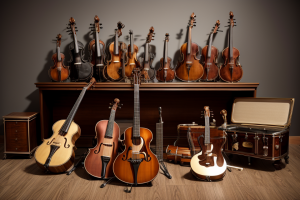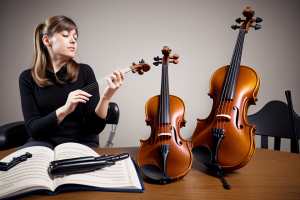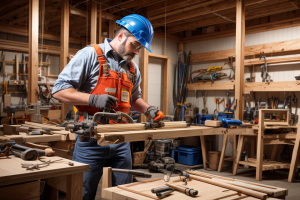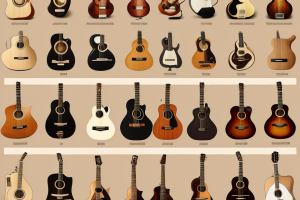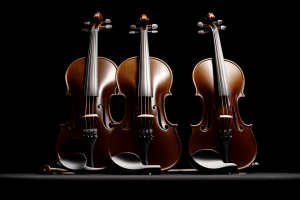
Are you looking for ways to reignite your passion for playing an instrument? Finding inspiration can be a challenge, but with the right techniques, you can discover new ways to stay motivated and inspired. Whether you’re a beginner or a seasoned musician, this article will provide you with tips and tricks to help you find the inspiration you need to keep playing. From exploring new genres to collaborating with other musicians, there are plenty of ways to stay inspired and keep your love for music alive. So, let’s dive in and discover the secrets to finding inspiration to play an instrument.
Why Playing an Instrument is Important
Benefits of Playing an Instrument
Playing an instrument can have numerous benefits for individuals of all ages. From improving cognitive abilities to reducing stress and anxiety, playing an instrument can have a positive impact on overall well-being.
Improved Cognitive Abilities
Studies have shown that playing an instrument can improve cognitive abilities such as memory, attention, and problem-solving skills. Learning to play an instrument requires focus and concentration, which can help strengthen these cognitive abilities over time.
Emotional Benefits
Playing an instrument can also have emotional benefits. It can be a great outlet for expressing emotions and can help individuals manage stress and anxiety. Playing music can also boost self-esteem and confidence, as individuals learn to master a new skill.
Social Benefits
Playing an instrument can also provide social benefits. Joining a band or orchestra allows individuals to connect with others who share a passion for music. It can also provide opportunities to perform in front of others, which can help build public speaking skills and confidence.
Improved Physical Health
Finally, playing an instrument can have physical health benefits. It can help improve breathing and lung function, as well as provide a form of exercise that can help maintain physical fitness.
Overall, playing an instrument can have a wide range of benefits for individuals of all ages. Whether it’s improving cognitive abilities, managing emotions, building social connections, or improving physical health, playing an instrument can have a positive impact on overall well-being.
Overcoming Common Obstacles
One of the most significant obstacles to playing an instrument is finding the motivation to practice consistently. However, with the right approach, it is possible to overcome these obstacles and develop a lifelong love of music. Here are some tips and tricks for staying motivated and overcoming common obstacles when learning to play an instrument.
- Set Realistic Goals: It’s essential to set realistic goals when learning to play an instrument. Whether it’s learning a new chord or a full song, setting achievable goals can help keep you motivated and build confidence. Break your goals down into smaller, manageable steps and reward yourself as you reach each milestone.
- Find Inspiration: Finding inspiration can be a great way to stay motivated when learning to play an instrument. Listen to music, watch live performances, or even just close your eyes and visualize yourself playing your instrument. There are countless sources of inspiration available, so find what works best for you and let it fuel your passion for music.
- Connect with Other Musicians: Connecting with other musicians can be a great way to stay motivated and improve your skills. Join a band, attend jam sessions, or simply connect with other musicians online. Collaborating with others can help you learn new techniques, share ideas, and build a supportive community of like-minded individuals.
- Practice with Purpose: It’s important to practice with purpose, rather than simply going through the motions. Find a balance between repetition and experimentation, and always challenge yourself to try new things. Whether it’s learning a new style or improving your technique, always have a purpose in mind when you practice.
- Take Breaks: It’s important to take breaks when learning to play an instrument. Practicing for long periods of time can lead to burnout and a lack of motivation. Take regular breaks, whether it’s a few minutes or a full day, and come back to your instrument refreshed and ready to practice.
By following these tips and tricks, you can overcome common obstacles and stay motivated when learning to play an instrument. Remember, music is a journey, and it’s important to enjoy the ride.
Discovering Your Musical Interests
Exploring Different Instruments
One of the best ways to find inspiration to play an instrument is to explore different instruments. Each instrument has its own unique sound and playing style, and by trying out different instruments, you may discover a new passion or find inspiration in a new direction. Here are some tips for exploring different instruments:
- Visit a music store or shop that rents instruments. Many music stores allow you to try out different instruments before you buy or rent them. This is a great opportunity to get a feel for different instruments and see which one resonates with you.
- Attend a music festival or concert. Music festivals and concerts are a great way to discover new music and see different instruments being played. Pay attention to the instruments being played and see if any of them inspire you to pick up an instrument yourself.
- Take a class or lesson. Taking a class or lesson on a new instrument can be a great way to learn the basics and discover if you have a passion for the instrument. Many music schools and studios offer lessons on a variety of instruments.
- Research different instruments online. There are many resources available online for learning about different instruments, including videos, tutorials, and articles. Take some time to research different instruments and see which ones spark your interest.
By exploring different instruments, you may find a new source of inspiration and motivation to play an instrument. Don’t be afraid to try new things and step outside of your comfort zone. You never know what new direction your musical journey may take you.
Identifying Your Musical Strengths
One of the most effective ways to stay motivated when learning an instrument is to focus on your strengths. By identifying the musical styles and genres that resonate with you, you can channel your passion and enthusiasm into practicing and improving your skills. Here are some tips for identifying your musical strengths:
- Reflect on your musical background: Think about the types of music that you enjoy listening to and the instruments that you find appealing. This can give you a good starting point for exploring your musical interests.
- Consider your natural abilities: Some people have a natural affinity for certain instruments or musical styles. Pay attention to what comes easily to you and what feels natural and enjoyable to play.
- Experiment with different genres: Don’t be afraid to try out different types of music and instruments to see what you enjoy playing the most. You may be surprised by what you discover.
- Seek feedback from others: Ask friends, family, or music teachers for their opinions on your strengths and weaknesses as a musician. This can help you identify areas where you excel and areas where you may need to focus more attention.
By focusing on your musical strengths, you can build confidence and motivation to continue learning and improving your skills.
Cultivating a Positive Practice Environment
Creating a Comfortable Space
A crucial aspect of maintaining a consistent and enjoyable practice routine is to create a comfortable space that fosters creativity and relaxation. The following are some tips to help you design a space that inspires musical growth:
- Personalize your space: Decorate your practice area with personal items, such as photographs, artwork, or musical memorabilia, to create a space that reflects your individuality and personality. This will help you feel more connected to your instrument and motivated to practice.
- Optimize acoustics: Select a room with good acoustics for playing your instrument. If possible, invest in soundproofing materials or use an acoustic guitar with a pickup to practice without disturbing others. Good acoustics will allow you to hear your progress and make adjustments to your playing more easily.
- Ensure proper lighting: Adequate lighting is essential for reading sheet music, playing, or even just enjoying the process of making music. Position your practice area near a window or invest in good lighting fixtures to ensure that you can see clearly while playing.
- Keep your instrument in good condition: Maintaining your instrument is essential for both playability and motivation. Make sure your instrument is clean, well-tuned, and properly maintained. Regular maintenance will help prevent issues that could hinder your progress and demotivate you from practicing.
- Organize your space: Keep your practice area organized to make it easier to find what you need and avoid distractions. Store your sheet music, books, and other accessories in a designated area, and keep your instrument and accessories clean and well-maintained.
By following these tips, you can create a comfortable and inspiring space that will help you maintain a positive practice environment and stay motivated to play your instrument.
Setting Realistic Goals
One of the most effective ways to stay motivated when learning an instrument is to set realistic goals for yourself. By setting achievable objectives, you can measure your progress and experience a sense of accomplishment as you work towards your musical aspirations.
Here are some tips for setting realistic goals:
- Start with small, achievable goals: Begin by setting small, attainable goals that are within reach. For example, if you’re just starting out, your goal might be to learn a few basic chords or to play a simple melody. As you become more proficient, you can gradually increase the difficulty of your goals.
- Break larger goals into smaller steps: If you have a larger goal in mind, such as performing in a recital or recording an album, break it down into smaller, more manageable steps. For example, you might start by learning a few songs for your performance or recording a demo of your music.
- Focus on the process, not just the outcome: It’s important to remember that the process of learning an instrument is just as important as the end result. By focusing on the process and enjoying the journey, you’ll be more likely to stay motivated and engaged.
- Be flexible and adaptable: Life is unpredictable, and it’s important to be flexible and adaptable when it comes to your musical goals. If you find that a particular goal is too difficult or too easy, don’t be afraid to adjust it. The most important thing is to keep moving forward and making progress.
By setting realistic goals for yourself, you’ll be more likely to stay motivated and engaged in your musical pursuits. So take some time to think about what you want to achieve, and then break those goals down into smaller, more manageable steps. With patience, persistence, and a positive attitude, you’ll be well on your way to achieving your musical aspirations.
Finding Inspiration in Music
Analyzing the Music You Love
Analyzing the music you love is a great way to find inspiration to play an instrument. By studying the techniques and styles of your favorite musicians, you can gain a deeper understanding of the music you love and find new ways to express yourself through your own playing. Here are some tips for analyzing the music you love:
- Listen closely: Pay attention to the details of the music, such as the melody, harmony, rhythm, and instrumentation. Try to identify the different elements that make the music unique and appealing.
- Study the sheet music: If you have access to the sheet music for the music you love, take the time to study it carefully. Look for patterns and structures in the music, and try to replicate them on your own instrument.
- Learn from recordings: If you don’t have access to sheet music, you can still learn from recordings of the music you love. Listen to the music over and over again, and try to imitate the different parts and techniques used by the musicians.
- Attend concerts and performances: If possible, attend concerts and performances of the music you love. This can give you a deeper appreciation for the music and help you understand the techniques and styles used by the musicians.
By analyzing the music you love, you can gain a better understanding of the techniques and styles used by your favorite musicians. This can help you find new ways to express yourself through your own playing and can also help you develop your own unique style.
Attending Live Performances
One of the most effective ways to find inspiration to play an instrument is by attending live performances. This can be a powerful way to experience the music you love in a new and exciting way, and can also help you connect with other musicians and music lovers. Here are some tips for making the most of live performances:
- Pick a performance that inspires you: Attend a performance that features the type of music or genre that you are interested in playing. This can help you feel more connected to the music and motivated to play yourself.
- Listen actively: Pay close attention to the musicians on stage and try to understand how they are creating different sounds and melodies. This can help you learn new techniques and inspire your own playing.
- Take notes: If you’re inspired by a particular performance, take notes on what you liked about it. This can help you remember what inspired you and how you can incorporate those elements into your own playing.
- Connect with other musicians: Attend performances where you can meet and connect with other musicians. This can help you build a community of like-minded individuals who can provide support and motivation for your own playing.
- Get up and play: Many live performances include opportunities for audience members to get up and play along with the musicians. Take advantage of these opportunities to get hands-on experience and practice playing in a live setting.
Overall, attending live performances can be a powerful way to find inspiration and motivation to play an instrument. By actively listening, taking notes, and connecting with other musicians, you can gain new insights and inspiration that can help you improve your own playing.
Collaborating with Other Musicians
Joining a Band or Ensemble
One of the most effective ways to stay motivated when playing an instrument is to collaborate with other musicians. Joining a band or ensemble is a great way to do this. It allows you to connect with other musicians who share your passion for music and can help you to develop your skills and inspire creativity.
Here are some tips for joining a band or ensemble:
- Determine what type of music you want to play.
- Research local bands or ensembles that play that type of music.
- Attend concerts or performances to get a feel for the local music scene.
- Reach out to local musicians or music teachers to find out about available opportunities.
- Consider starting your own band or ensemble if you can’t find one that fits your interests.
Joining a band or ensemble can be a great way to find motivation and inspiration when playing an instrument. It allows you to connect with other musicians, learn from them, and be inspired by their passion for music.
Connecting with Other Musicians Online
One of the most effective ways to stay motivated when playing an instrument is to connect with other musicians online. Here are some tips for finding and connecting with other musicians online:
- Utilize social media platforms: Social media platforms like Facebook, Twitter, and Instagram are great places to connect with other musicians. Join music-related groups on these platforms and engage with other members by sharing your music, asking for feedback, and offering feedback to others.
- Participate in online music communities: There are many online communities dedicated to music, such as Reddit’s “WeAreTheMusicMakers” community or the “Musicians” community on Meetup.com. These communities provide a platform for musicians to connect, collaborate, and share ideas.
- Use online music collaboration tools: There are many online tools available that allow musicians to collaborate on music projects remotely. Some popular tools include SoundCloud, Bandcamp, and Ableton Live. These tools allow musicians to share and collaborate on music projects in real-time, regardless of location.
- Attend online music events and festivals: Many music events and festivals have moved online in recent years, providing musicians with new opportunities to connect and collaborate. Attend online music events and festivals to network with other musicians and discover new opportunities for collaboration.
By connecting with other musicians online, you can stay motivated, gain new perspectives on your music, and discover new opportunities for collaboration.
Experimenting with New Styles and Techniques
Trying Out Different Genres
One way to find inspiration to play an instrument is to experiment with new styles and techniques. Trying out different genres can be a great way to discover new sounds and techniques that can help to reignite your passion for playing music. Here are some tips for trying out different genres:
- Listen to a wide variety of music: To find inspiration, it’s important to expose yourself to a wide variety of music. This can help you to discover new sounds and techniques that you may not have heard before. Try listening to music from different genres and time periods to broaden your horizons.
- Attend live performances: Attending live performances can be a great way to discover new music and techniques. Seeing musicians perform in person can give you a better sense of how they use their instruments and can help to inspire your own playing.
- Collaborate with other musicians: Collaborating with other musicians can be a great way to discover new styles and techniques. Working with other musicians can help you to learn new ways of playing and can help to spark your creativity.
- Take lessons from a variety of teachers: Taking lessons from a variety of teachers can help you to discover new styles and techniques. Each teacher may have a different approach to playing music, and this can help to broaden your horizons and inspire your own playing.
- Learn to play music from different cultures: Learning to play music from different cultures can be a great way to discover new styles and techniques. Different cultures have different approaches to playing music, and this can help to broaden your horizons and inspire your own playing.
By trying out different genres, you can discover new sounds and techniques that can help to reignite your passion for playing music. Experimenting with new styles and techniques can help to keep your playing fresh and inspiring, and can help to keep you motivated to continue playing your instrument.
Expanding Your Skillset
Expanding your skillset is a crucial aspect of finding inspiration to play an instrument. By pushing yourself to learn new techniques and styles, you open up new possibilities for creative expression and personal growth. Here are some tips for expanding your skillset:
- Take Lessons: Taking lessons from a qualified instructor can be an excellent way to learn new techniques and expand your musical knowledge. A teacher can help you identify areas where you need improvement and provide guidance on how to achieve your goals.
- Attend Workshops and Masterclasses: Attending workshops and masterclasses can be a great way to learn from experienced musicians and gain inspiration from other players. These events often focus on specific styles or techniques, so you can tailor your learning experience to your interests.
- Experiment with Different Genres: Experimenting with different genres of music can help you discover new techniques and expand your musical vocabulary. By learning the techniques used in different genres, you can incorporate them into your own playing and create a unique sound.
- Collaborate with Other Musicians: Collaborating with other musicians can be a great way to learn from others and gain new perspectives on your playing. By working with other players, you can learn new techniques, gain inspiration, and develop your own musical style.
- Practice Regularly: Regular practice is essential for expanding your skillset. By dedicating time each day to practicing, you can improve your technique, build your confidence, and unlock new possibilities for creative expression.
Staying Motivated in the Long-Term
Celebrating Small Successes
Playing a musical instrument can be a rewarding and fulfilling experience, but it can also be challenging to stay motivated in the long-term. One effective strategy for maintaining motivation is to celebrate small successes along the way.
Celebrating small successes can help to reinforce positive habits and keep you engaged with your instrument. For example, if you’ve been practicing a new piece of music, celebrating when you learn a new section or master a difficult passage can help to boost your confidence and keep you motivated to continue learning.
It’s important to remember that musical progress is not always linear, and setbacks are a normal part of the learning process. By celebrating small successes, you can help to build resilience and maintain a positive mindset even when things get tough.
To celebrate small successes, try setting small, achievable goals for yourself. For example, you might aim to learn a new chord progression or master a specific rhythm. When you achieve these goals, take a moment to acknowledge your progress and give yourself a pat on the back. This can help to reinforce positive habits and keep you motivated to continue learning.
Additionally, it can be helpful to share your progress with others. Whether it’s a friend, family member, or fellow musician, sharing your progress with someone else can help to keep you accountable and give you a sense of support and encouragement.
In summary, celebrating small successes is a powerful tool for maintaining motivation in the long-term. By acknowledging your progress and setting small, achievable goals, you can build resilience, maintain a positive mindset, and continue to make progress as a musician.
Surrounding Yourself with Supportive People
When it comes to staying motivated to play an instrument, having a supportive community around you can make all the difference. Surrounding yourself with people who understand and appreciate your passion for music can help keep you inspired and dedicated to your craft. Here are some tips for finding and nurturing supportive relationships with others:
- Join a Music Group or Club
One of the best ways to connect with other musicians is to join a music group or club. This could be a local group that meets regularly to practice and perform, or an online community of musicians who share tips and advice. Being part of a group can help you build relationships with others who share your interests and goals, and can provide a sense of accountability and motivation to practice and improve. - Attend Music Concerts and Events
Attending music concerts and events is another great way to connect with other musicians and music lovers. Not only can you enjoy live performances and discover new music, but you can also meet other people who share your passion for music. You may even find opportunities to collaborate with other musicians or learn from more experienced players. - Find a Music Mentor
If you’re looking for more personalized guidance and support, consider finding a music mentor. This could be a teacher, a more experienced musician, or someone who has achieved success in the music industry. A mentor can provide valuable advice and encouragement, and can help you stay motivated and focused on your goals. - Connect with Other Musicians Online
In today’s digital age, it’s easier than ever to connect with other musicians online. Social media platforms like Facebook, Twitter, and Instagram can be great places to find and connect with other musicians. You can join music-related groups, follow influential musicians and music industry professionals, and share your own music and experiences with others.
By surrounding yourself with supportive people who share your passion for music, you can stay motivated and inspired to continue playing and improving your instrument. Whether it’s through joining a music group, attending concerts and events, finding a music mentor, or connecting with other musicians online, there are many ways to build a supportive community of like-minded individuals who can help you stay on track and achieve your musical goals.
FAQs
1. What are some ways to find inspiration to play an instrument?
Answer: Finding inspiration to play an instrument can come from many different sources. One way is to listen to music and watch performances by other musicians. You can also try playing along with your favorite songs or learning new songs to challenge yourself. Additionally, exploring different genres of music and trying new styles can help spark creativity and inspiration.
2. How can I stay motivated to practice my instrument regularly?
Answer: Setting goals for yourself can help you stay motivated to practice regularly. Start by setting small, achievable goals that build on each other. For example, if you want to learn a new song, break it down into smaller parts and set a goal to practice each part for a certain amount of time each day. You can also practice with a metronome to improve your timing and consistency. Additionally, playing with others or performing in front of an audience can help keep you motivated and excited about your instrument.
3. What are some tips for overcoming creative blocks when playing an instrument?
Answer: Creative blocks can be frustrating, but there are ways to overcome them. One tip is to take a break and come back to your instrument with fresh eyes and ears. You can also try playing around with different scales or modes to add some variety to your playing. Additionally, experimenting with different rhythms and grooves can help break up any patterns you may be stuck in. Finally, try collaborating with other musicians or listening to different types of music to get new ideas and inspiration.
4. How can I improve my musical skills and technique on my instrument?
Answer: Improving your musical skills and technique on your instrument takes time and practice. One way to improve is to focus on developing good habits, such as proper posture, hand positioning, and breath control. You can also practice exercises specifically designed to improve your technique, such as scales, arpeggios, and finger exercises. Additionally, working with a teacher or mentor can help you get personalized feedback and guidance on how to improve your playing. Finally, be patient with yourself and remember that progress takes time and effort.
